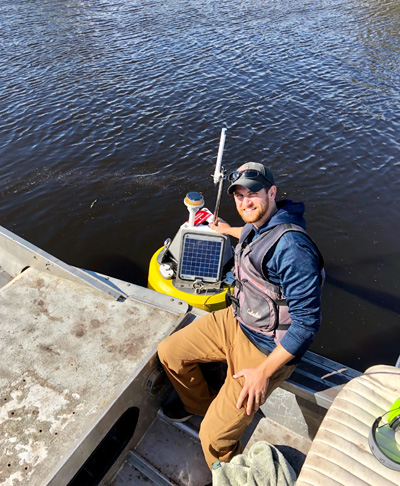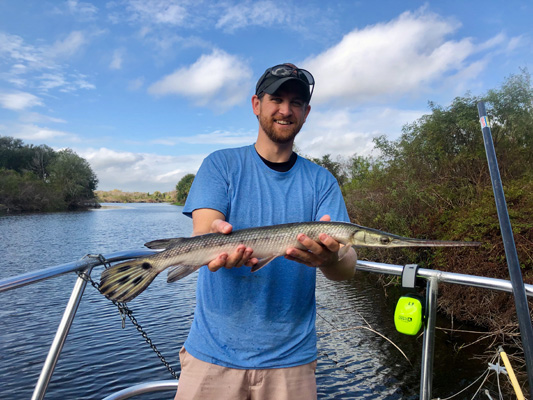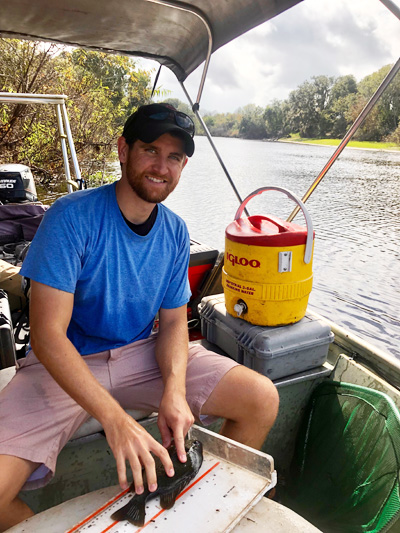 The
Kissimmee River Restoration project is a cost-shared endeavor between the South Florida Water Management
District (SFWMD) and the US Army Corps of Engineers (USACE). Since 1995, the SFWMD has partnered with CES to manage
Riverwoods Field Lab as a research and education center as well as provide support staff for the scientific evaluation program. The SFWMD responsibilities include conducting the biological monitoring and research, land acquisition and education related to the Kissimmee River Restoration. The scientists have developed a comprehensive evaluation plan to measure the success of the restoration project that will be in effect until 2018. An integral component to the restoration is the scientific evaluation of restoration success. The SFWMD’s Kissimmee scientists have established the Kissimmee River Restoration Evaluation Program that outlines 25 performance measures that are used to quantify the success of the project. Four of the restoration expectations are based on the recovery of macroinvertebrate communities in the restored Kissimmee River and floodplain.
The
Kissimmee River Restoration project is a cost-shared endeavor between the South Florida Water Management
District (SFWMD) and the US Army Corps of Engineers (USACE). Since 1995, the SFWMD has partnered with CES to manage
Riverwoods Field Lab as a research and education center as well as provide support staff for the scientific evaluation program. The SFWMD responsibilities include conducting the biological monitoring and research, land acquisition and education related to the Kissimmee River Restoration. The scientists have developed a comprehensive evaluation plan to measure the success of the restoration project that will be in effect until 2018. An integral component to the restoration is the scientific evaluation of restoration success. The SFWMD’s Kissimmee scientists have established the Kissimmee River Restoration Evaluation Program that outlines 25 performance measures that are used to quantify the success of the project. Four of the restoration expectations are based on the recovery of macroinvertebrate communities in the restored Kissimmee River and floodplain.
For information about some SFWMD’s Kissimmee River Restoration Research Studies:
Vegetation Studies lead by Amber Graham: http://www.ces.fau.edu/riverwoods/vegetation-study.php
Macroinvertebrate Studies lead by Joseph Koebel: http://www.ces.fau.edu/riverwoods/macro-invert-studies.php
Alex Dyson joined the CES team to support the Kissimmee River Restoration research. In his role as Environmental Scientist, Alex supports all the biological monitoring that fulfills the Kissimmee River Restoration (KRR) Evaluation Program.
 Alex earned his Bachelor of Science degree in Environmental Science from North Carolina State University. He has gained valuable experience in a variety of positions. His epic adventures include tracking timber rattlesnakes in Pennsylvania, tagging salmon in the Pacific Northwest and hiking the Colorado Rocky Mountains in search of prairie dogs and ptarmigan (grouse). Alex has covered the State of Florida actively seeking invasive and threatened species. From time spent searching for pythons in the Everglades and Keys, to his favorite position before coming to FAU, as a black bear capture technician in the Florida Panhandle, Alex dedicates himself to “up close and personal” experiences with these incredible animals.
Alex earned his Bachelor of Science degree in Environmental Science from North Carolina State University. He has gained valuable experience in a variety of positions. His epic adventures include tracking timber rattlesnakes in Pennsylvania, tagging salmon in the Pacific Northwest and hiking the Colorado Rocky Mountains in search of prairie dogs and ptarmigan (grouse). Alex has covered the State of Florida actively seeking invasive and threatened species. From time spent searching for pythons in the Everglades and Keys, to his favorite position before coming to FAU, as a black bear capture technician in the Florida Panhandle, Alex dedicates himself to “up close and personal” experiences with these incredible animals.
Alex’s extraordinary work history uniquely qualifies him to address many of the performance measures integral to the KRR Evaluation Program. He assists scientists with field and data collection on all of these studies:
Avian
Avian
Fish Communities
Herpetology
Invertebrates
Vegetation
Water Quality

Alex’s primary responsibilities focus on fish abundance, wading bird food availability, vegetation burn studies, apple snail surveys, geomorphology studies, and construction monitoring. Alex takes the lead working with FAU’s I-SENSE (Sensing and Embedded Network Systems Engineering) water quality buoy and Dissolved Oxygen (DO) data collection system.
Alex’s favorite study is electrofish sampling. It provides a unique look at the condition of fish populations and provides a picture of the overall health of the system. Alex tells us that electrofishing is easily the most fun and active surveying that you can do. The number of fishermen and data indicate that the fish populations are successfully rebounding!
Alex is also excited about the discovery of large numbers of snail kites in the newly inundated floodplain across from Riverwoods. He says that “Watching the Endangered Everglades Snail Kite start to thrive so quickly due to restoration efforts shows just how important it is to finish the Kissimmee River Restoration.”
Alex will soon begin his graduate studies at FAU. His advice for students considering a career in environmental sciences or management; “Stick with it.” He believes that these jobs are becoming increasingly more competitive and that experience is the key. He says, “I can’t think of anything that I’d rather be doing! If you love science and working outside, keep your grades up and get all the experience that you can. It will pay off with the best job you could ever imagine.”